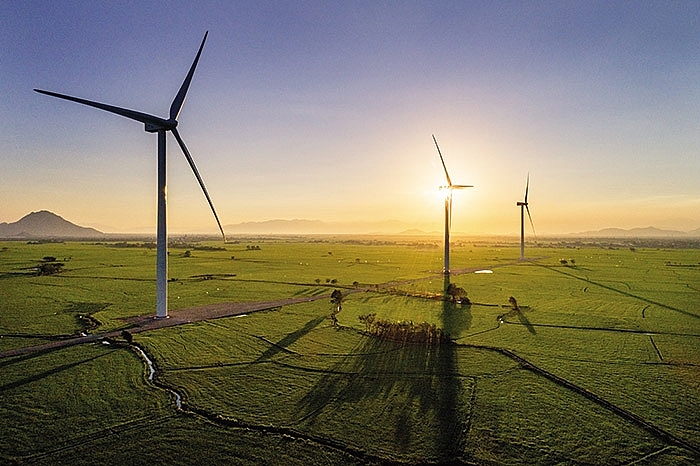Preparing for a smarter future
 |
| Koos Neefjes, director and climate change expert from Climate Sense Company |
A smart energy industry is a forward-thinking one, creating future opportunities for both investors and consumers.
It is an industry that uses information technology, is at the core of the Internet of Things, and is part of the Fourth Industrial Revolution with innovations in artificial intelligence and material science. It is also a future in which most of our energy will be green and clean. Public and private transportation will run off electricity; vehicle batteries will become part of storage capacity in the electricity grid; efficiencies will go up through decentralised power production by citizens, private and public enterprises; there will be smart management of power demand and supply; and there will be new jobs.
So, is Vietnam on the way to having a smart energy industry? And what opportunities does it offer for investors? My answer to these questions is yes. But only partly, and more must be done.
First, many strategies exist that contain elements of a future smart energy industry, but it’s not yet enough for an energy transformation like that occurring in other nations.
The country needs to formulate an energy strategy that has a radically different vision: an energy future that is green, clean, mostly electric, interconnected, intelligent, and that brings benefits to all. This means that electricity production must become much more decentralised, diverse, and renewable; the future of transportation must become electric; industries must become much cleaner; and housing and construction must become much more energy efficient.
Second, Vietnam is planning ahead for growth in renewable energy, but only modestly. The nation has plenty of sun and wind sources, especially in the centre and south, but according to current plans most electricity in 2030 and even into 2050 will still be generated by burning coal.
This contrasts with trends happening in most countries, including developing ones, which are decommissioning coal-power plants, and slowing down planning and construction. If nations like Vietnam do not follow this trend, the global fight against climate change will be very difficult.
I think the country must urgently rethink its power development plans, because the alternative will be cheaper and cleaner, and will ultimately improve national energy security.
There are over a dozen countries where solar photovoltaics and wind power are already currently cheaper than coal power. According to research this will happen in Vietnam in no more than a few years, and if a tax were to come in on carbon to compensate for environmental and health costs, they will become immediately cheaper.
 |
| Most nations are slowing down or halting coal-power plants, a trend that Vietnam must embrace to create smart energy, Photo: shutterstock |
Some coal-power plants have high efficiency and are less polluting than existing plants. However, they are much more expensive per unit of electricity over their economic lifetime, they need a continuous supply of, mostly imported, coal, and they produce huge amounts of solid waste.
Also, the government must limit public debts, so opportunities for private investment in clean power must be created and I think that that is possible, even easy to do. The current feed-in-tariffs in Vietnam for solar and wind energy have already generated interest among private investors and construction of several solar farms is now underway. If these tariffs are reduced in the future interest will remain because solar and wind power technology is becoming cheaper every year.
Third, there are a number of policies and regulations in place to encourage energy efficiency and renewable energy, but some of the most important administrative and technical regulations are either weak or missing. An example of this is a regulation on net-metering, meaning that a household, community, or business with solar photovoltaic panels on their roof interconnects their system with the power grid.
They consume electricity produced by themselves, send excess power into the grid, and buy from the grid when their demand is higher than supply, notably at night. Regulation must happen regarding the technical equipment for the interconnection and the billing system with the local power distribution company.
Such regulation currently exists nationwide but is still not straightforward enough, which limits application. I estimate that even in Hanoi I would recover my investment in roughly seven years against current prices of equipment and power tariffs, whereas equipment can last for at least 20 years with little maintenance required. It would cost the state nothing, and the local power company could be allowed to charge a fee for the use of infrastructure. The nation can in this way increase renewable power production capacity through private investment. The consumer will benefit and jobs will be created. A win-win situation for all, but nationwide regulation has not yet been perfected.
Fourth, Vietnam is already seeing a surge in the use of electric scooters, with electric tourist vehicles becoming a common sight. But the country’s transport policies, car industry and construction sector show a few signs of a bold move into the future.
The major car companies in the world are rapidly developing electric cars, buses, vans and trucks, and some are already planning for the complete phase-out of internal combustion engines.
Several countries and cities across the globe are making policies for phasing out the production, sale and use of diesel cars with petrol cars to eventually follow suit. A number of nations are already setting targets to phase in the dominance of electric car sales as soon as 2025. This will have a major impact on the power sector, and if correctly regulated offers a number of opportunities for Vietnam. Car batteries can be charged when there is excess power production and they can feed back into the grid at times of high demand, for which they must be connected to the power-grid as well as the Internet-of-Things.
To create opportunities for investment as well as consumer benefits from this new concept, transport-energy management changes must happen such as new designs for parking spaces and buildings. Your home, farm, factory or office will become your petrol station, and your vehicle becomes a power source.
Fifth, electricity transmission and distribution infrastructure must be reinforced and made smart to enable a transformation to decentralise electricity production. Infrastructure must deal with variable renewable energy production, ensure dynamic demand as well as supply management, and enable electric transport.
I believe that official development assistance (ODA), meaning international public support for Vietnam’s energy sector, should focus on increasing the capacity and the smart aspects of infrastructure. It also must create energy storage within the system, for example by pumping water into lakes when there is too much solar or wind power generation, which can be used to generate power in times of shortages. With this focus, ODA will enable small and large private investors to benefit from renewable power.
Finally, the manufacturing of renewable energy equipment has already begun in the nation. Some Vietnamese private enterprises produce solar water heaters and solar components and there are several large foreign investments in manufacturing facilities already complete or on the way. These investments will facilitate the manufacture of solar components and wind towers. These factories produce mainly for export. They have developed with few government incentives and with additional policies to open the domestic market they can enjoy faster growth. They will generate high numbers of jobs, as global data shows that renewable energy is much better for employment than the mining and petroleum sector.
But they require qualified workers, so universities and colleges must provide appropriate training. A key role for the government is to drive education and training towards a smart energy future.
What the stars mean:
★ Poor ★ ★ Promising ★★★ Good ★★★★ Very good ★★★★★ Exceptional
Related Contents
Latest News
More News
- Bac Ai Pumped Storage Hydropower Plant to enter peak construction phase (January 27, 2026 | 08:00)
- ASEAN could scale up sustainable aviation fuel by 2050 (January 24, 2026 | 10:19)
- 64,000 hectares of sea allocated for offshore wind surveys (January 22, 2026 | 20:23)
- EVN secures financing for Quang Trach II LNG power plant (January 17, 2026 | 15:55)
- PC1 teams up with DENZAI on regional wind projects (January 16, 2026 | 21:18)
- Innovation and ESG practices drive green transition in the digital era (January 16, 2026 | 16:51)
- Bac Ai hydropower works stay on track despite holiday period (January 16, 2026 | 16:19)
- Fugro extends MoU with PTSC G&S to support offshore wind growth (January 14, 2026 | 15:59)
- Pacifico Energy starts commercial operations at Sunpro Wind Farm in Mekong Delta (January 12, 2026 | 14:01)
- Honda launches electric two-wheeler, expands charging infrastructure (January 12, 2026 | 14:00)

 Tag:
Tag:




















 Mobile Version
Mobile Version